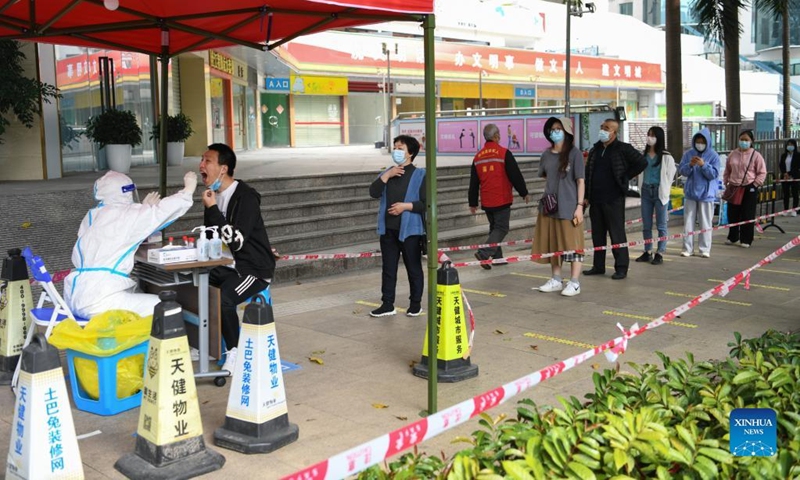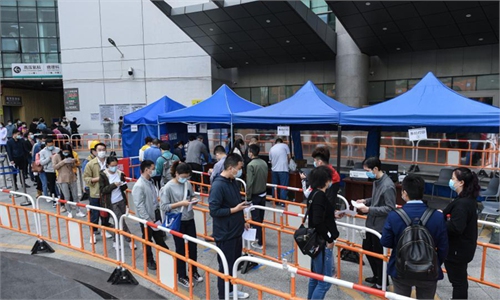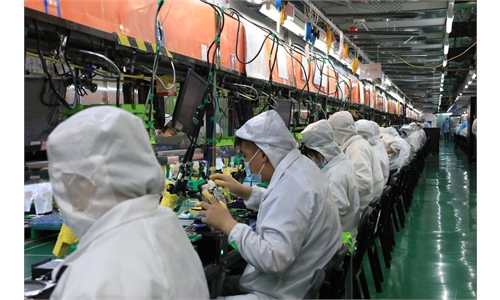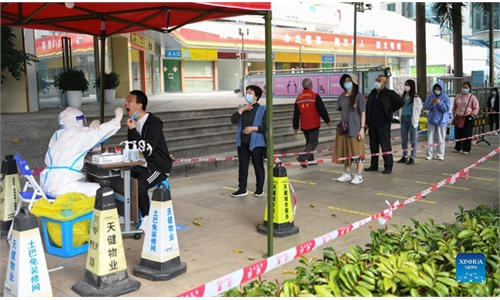Businesses in Shenzhen strive to ensure production, as city prepares for work resumption
City to allow companies resume work, production orderly: official
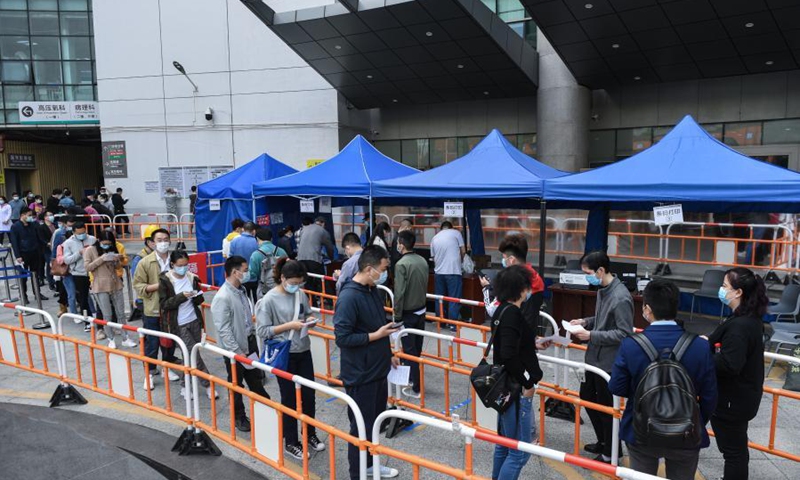
People wait in line for nucleic acid tests at a COVID-19 testing site in Huazhong University of Science and Technology Union Shenzhen Hospital (Nanshan Hospital) in Shenzhen, south China's Guangdong Province, Jan. 26, 2021.
Businesses in Shenzhen, dubbed as the Silicon Valley of China, have been taking various measures to ensure production, after the city implemented strict anti-epidemic measures in the wake of new COVID-19 flare-ups, which has seen many businesses suspend operations.
Some have adopted closed-loop management at their plants, while others rushed transport of materials and production lines - which all helped minimize the impact of the epidemic on operations, industry practitioners said.
Meanwhile, on Thursday, a Shenzhen official said that the city will give a green light to enterprises to resume work and production in an orderly manner, based on epidemic prevention and control considerations.
The Shenzhen epidemic control authority announced on Thursday that five districts in the city that have met the requirements of the dynamic zero-COVID policy will resume normal work and life starting on Friday. Buses and subways will also resume. The city vowed targeted measures to achieve maximum effects of epidemic control with minimum costs.
"At present, the epidemic prevention and control situation is improving, and Shenzhen is pushing forward the resumption of work and production in an orderly manner and by location and classification," Huang Qiang, deputy secretary general of the Shenzhen municipal government, said at a press conference on the city's epidemic situation.
Some enterprises and factories have stopped production, while other enterprises in industrial parks have implemented closed-loop management. In addition, research and development (R&D) experts and administrative staffers have basically been working at home, the Global Times learned.
"The factory is idle but administrative staffers and R&D technicians are working at home. We just shipped a big order before the current outbreak, and the next order is scheduled to be delivered to France and Spain in May," a manager surnamed Deng of a Shenzhen-based smart appliances manufacturer and exporter told the Global Times on Thursday.
According to Deng, Shenzhen enterprises have become accustomed to the epidemic control measures.
"It's not the first time we've suspended production. Massive nucleic acid test procedures in Shenzhen are so frequent that we often joke: Shenzhen residents are either doing nucleic acid tests or are on the way to do them," said Deng.
Shenzhen is also an important cluster of the mobile phone industry. Most of the actual production is scattered around and in other provinces, so the impact is limited, insiders said.
"As the first half of the year is usually the off-season for the industry, if the suspension lasts only one or two weeks, it is expected to have a minor sustained impact on the industry chain," an employee of a mobile phone component manufacturer based in Shenzhen told the Global Times.
Semiconductor and display panel producers cannot afford to halt work even for a second due to the special production process, industry practitioners said. But they noted that there would be no significant impact as the majority of manufacturers have ample inventories, with scattered production sites.
"Although production in the Shenzhen workshop has been suspended, our manufacturing is still proceeding in other cities in the province. The impact of the epidemic is limited," a staffer of Shenzhen Zhengmingke Electronics Co told the Global Times on Thursday.
The company specializes in electronic chips. However, the staffer noted that the logistics situation in Shenzhen is not very smooth, and capacity is about 60 percent of normal.
According to several logistics enterprises, 80-90 percent of warehouses in Shenzhen have suspended operations, but they are expected to reopen on Sunday. Shenzhen's major ports are operating normally.
"Overall, we expect a delay in delivery time of seven to 10 days caused by the Omicron spike," the staffer of Zhengmingke Electronics said.
Affected by the epidemic, Shenzhen and nearby Dongguan, another manufacturing hub, upgraded containment measures over the weekend. Before the measures were implemented, local enterprises rushed to transport materials in their Shenzhen and Dongguan bases to other bases in the country overnight to stabilize production and supply.
"About 70 percent of our supply chain is concentrated in Shenzhen and Dongguan. If there is a problem with the Shenzhen base, it will affect other bases," a person in charge of the Guangzhou production base of TV manufacturer Skyworth told the Global Times.
Shenzhen's Shiyan Residential District ordered all enterprises, except those that ensure people's livelihoods and basic urban operations, to stop production from Monday to Sunday.
"All 30 carloads of materials from Shenzhen and Dongguan were transferred to the Guangzhou base, [East China's] Nanjing base and bases in [North China's] Inner Mongolia late at night on March 13 to ensure production for one week," said the person.
Because Skyworth's Shiyan base in Shenzhen is mainly responsible for the production of export models, export shipments are now tight.
Skyworth's Guangzhou base, which mainly covers about 40 percent of production for the domestic market, now also receives some export orders.
